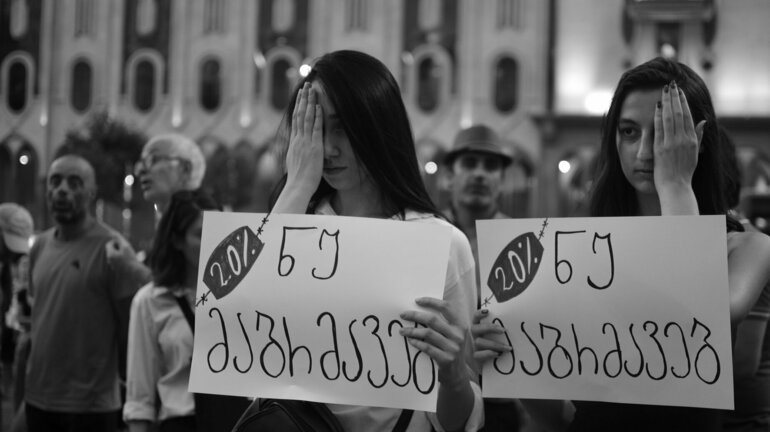Civil and political turmoil in Georgia

On the morning of 20 June, a session of the Interparliamentary Assembly on Orthodoxy (IAO) opened in the parliament building in Tbilisi, Georgia. It was chaired by Sergei Gavrilov, a Russian deputy of the State Duma and a member of the Communist Party. During the break, Georgian opposition MPs stormed into the chamber and demanded that the Russian delegation leave the building. Video footage of the incident immediately went viral, alerting the public to the fact that there was a representative of Russia in Georgia’s Parliament and that he was presiding over a meeting from the Speaker’s chair. The news sparked general outrage, and thousands of Georgians rallied in protest outside Parliament. The Interparliamentary Assembly on Orthodoxy (IAO) issued a statement claiming that nothing untoward had occurred during the session; it also stated that it strongly condemned the “unlawful” actions of some members of the Georgian Parliament. So what prompted this furious reaction from the Georgian public?
The occupying force
In the conflict over Georgia’s breakaway regions of Abkhazia and South Ossetia, Russia, in the eyes of many Georgians, has assumed the role of an occupying power. Following the war in the Caucasus, Russia continues to occupy the two regions, amounting to 20 per cent of Georgian territory, and is one of the few countries to officially recognise the independence of Abkhazia and South Ossetia. Gavrilov himself voted in favour of recognition. Many Georgians have been expelled from these two regions, while in South Ossetia, Russia is engaged in a campaign of “occupation by stealth”, seizing additional Georgian territory by gradually shifting the barbed wire border fences back towards Georgia and systematically arresting anyone committing alleged border violations. The murder of Giga Otkhozoria at the border in 2016 and the torture and murder of Archil Tatunashvili in 2018 are unhealed wounds for Georgians.
For many of the protesters, Russia is implicated in these tragedies. So when a representative of Russia sat in the Speaker’s chair in the Georgian Parliament and presided over a meeting – and, making matters worse, did so in Russian, civil and political turmoil erupted within Georgian society.
But Russia was not the only target of the protests. With their anti-government “Shame!” campaign, the protesters also turned on Georgian Dream, Georgia’s ruling party, which had allowed the meeting chaired by Gavrilov to go ahead in the parliament building. Recent polls indicate that the party and its leader Bidzina Ivanishvili have lost the confidence of the Georgian people, but this latest protest against the present government is undoubtedly the largest and most prolonged.
Key facts
According to official figures, on the first day of protest, more than 300 demonstrators were arrested and at least 200 people were hospitalised after the police used tear gas, rubber bullets and water cannon. The following day, the Georgian Parliament’s Speaker Irakli Kobakhidze announced his resignation just as a second large-scale demonstration took place outside the building. Chanting “Don’t make me blind!“ – a reference to the rubber bullets deployed by the police – the protesters demanded the release of everyone who had been arrested and the immediate resignation of Internal Affairs Minister Giorgi Gakharia, who they hold responsible for the excessive force used by the police. Another demand was the introduction of proportional representation in future to ensure that the number of parliamentary seats gained by the political parties reflects the percentage of the votes received by them in elections.
The same day, 20 influential Georgian NGOs issued a Statement on the 20 June Events. Their demands largely chime with those of the demonstrators. In their statement, they also offer to mediate between the government and opposition. Even former Prime Minister Giorgi Kvirikashvili, who resigned in 2018, broke his one-year silence and urged Bidzina Ivanishvili to heed the demands of the demonstrators, opposition and non-governmental organisations.
Russian President Vladimir Putin, meanwhile, suspended all Russian airline flights from Russia to Georgia from 8 July. Russian tourists in Georgia were told to return home and Russian travel agents will no longer offer tours to Georgia. In response, the social media campaign “Spend Your Summer in Georgia” was launched in Georgia in order to mitigate the possible impacts of the Russian bans on the local tourism industry.
A new civil and political reality
As a result of the 20 June protests and the police’s heavy-handed tactics against the demonstrators, a new civil and political reality is emerging in Georgia. Many Georgians are reminded of events from their country’s recent history: 2011, for example, when protests against the then President Mikheil Saakashvili led to violent clashes between demonstrators and the police; and 2007, when the government used tear gas, rubber bullets and water cannon against mass protests by the opposition, injuring large numbers of people. But these latest events are particularly reminiscent of the anti-Soviet protests on 9 April 1989. Both cases are expressions of national sentiment against the Kremlin’s geopolitical ambitions. The current situation has at least yielded some partial victories for the protesters: Bidzina Ivanishvili has announced plans to introduce proportional representation, and detained protesters have now been freed. Even so, the situation remains tense. What the protesters want, above all, is for the Internal Affairs Minister to accept responsibility for the police violence and to resign. Meanwhile, the Georgians are still protesting.
Sociologist Diana Bogishvili is a researcher at ZOiS and a PhD candidate at the Berlin Graduate School of Social Sciences at Humboldt-Universität zu Berlin.